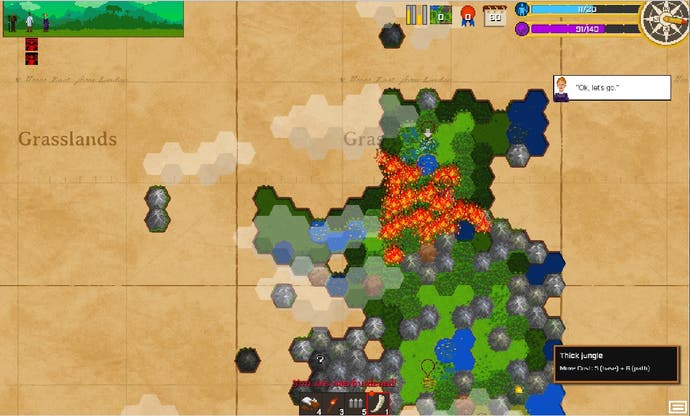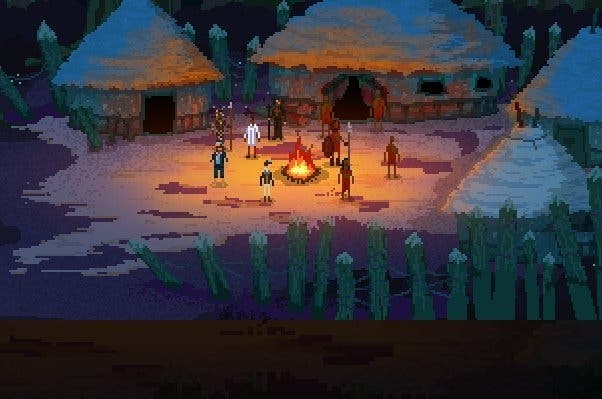That time Marie Curie set a donkey on fire
It's all part of the nasty fun in The Curious Expedition.
During her hectic and industrious life, Marie Curie soaked up so much radiation that her bones, if placed on the correct kind of treated plate, would photograph themselves. I read that ages ago anyway; I have no idea if it's true. My own expertise regarding Curie revolves around an earlier period: the wilderness years, the explorer years. You know, the time she spent hacking through the grasslands of Africa and the jungles of South America, limping from one ill-considered leopard fight to another, and trading her donkey, Mrs Rathbone, for a few pieces of chocolate and some shotgun ammo. Poor Mrs Rathbone.
Happily, this is the exact stretch of history covered by The Curious Expedition, which is currently in paid alpha, so you too can become as knowledgeable as me.
Remember the time that Curie, winner of Nobels in both Physics and Chemistry and the force behind the flickering blue glow that lit the way to the 20th century, discovered fire? Well, the time she rediscovered fire, anyway. She was napping by a waterfall and had neglected to douse the embers left from that evening's tea. One night turned into 30 - she was so sleepy! - and when she finally awoke, refreshed, Africa was ablaze in all directions. (Poor Mrs Rathbone.)
That one was probably my fault, actually, and it's the kind of throwaway calamity that The Curious Expedition is always conjuring from its various moving parts. This is a simple exploration game when you get down to it, played out with a procedural map and your own imagination. But by the time you have gotten down to it, it rarely seems so simple anymore. Generally, the moment it all clicks is the moment the donkeys start burning.

At least the objective is simple: pick a hero from the likes of Curie, or Tubman, or Tesla (they all come with handy perks), and then pitch them into the hex-based wilderness on a mission to find a golden pyramid before resources run down or the local wildlife proves too bloodthirsty. Once the pyramid is found, the adventure begins again somewhere else, and you accumulate fame as you go. The genius is that the developers have really thought about the glory days of exploration - frequently not glorious, incidentally, for the people whose countries were being explored - and have built the game around two systems that remind you quite sternly why racing into the underbrush with a pith helmet and some funny shorts on was rarely a particularly good idea for anybody, least of all a Nobel laureate.
The first of these systems is fog of war, pushed back with every tile you travel across, but more than capable of hiding nasty treats in the form of deadly animals, impregnable mountains or un-fordable rivers. There's a compass that will eventually point the way to the golden pyramid, but it only becomes accurate once you've wandered about a bit first. Maybe it is shy. Equally, you can blast a path through mountains, but only if you have dynamite, and dynamite often brings its own problems.
Then there's your sanity, constantly dropping with every journey you make, and with the severity of those drops dependant on the kind of terrain you cover and the route you take across it. This is where the game's rather jolly pixel art betrays a much starker atmosphere. As the days draw on and your party starts to grow increasingly delicate, allies begin to chatter and hold disconcertingly complex conversations with people who don't actually seem to be there in the traditional sense. Villages can offer you respite, and a quick nap will top your sanity back up again, but these things are not without pitfalls themselves, as a donkey friend of mine could tell you. And this world has pitfalls that would render fire the very least of your problems.
If there's a weak point with the current alpha build, I personally think it's combat. This is a clever enough system involving dice rolls that tie it into your party's strengths and weaknesses, but it feels like an abstraction too far at the moment, and it keeps the pulpy, grisly nastiness of the game's milieu at arm's length. Luckily, though, when a bunch of idiots - even Nobel-toting idiots - head off in search of foreign treasure, getting in a fight with a bear is probably the safest thing they'll end up doing. The Curious Expedition might walk a careful path in terms of some of the historical ideas it toys with, in other words, but the act of play reveals the deep, innate criticisms of those ideas that cannot really be avoided.









